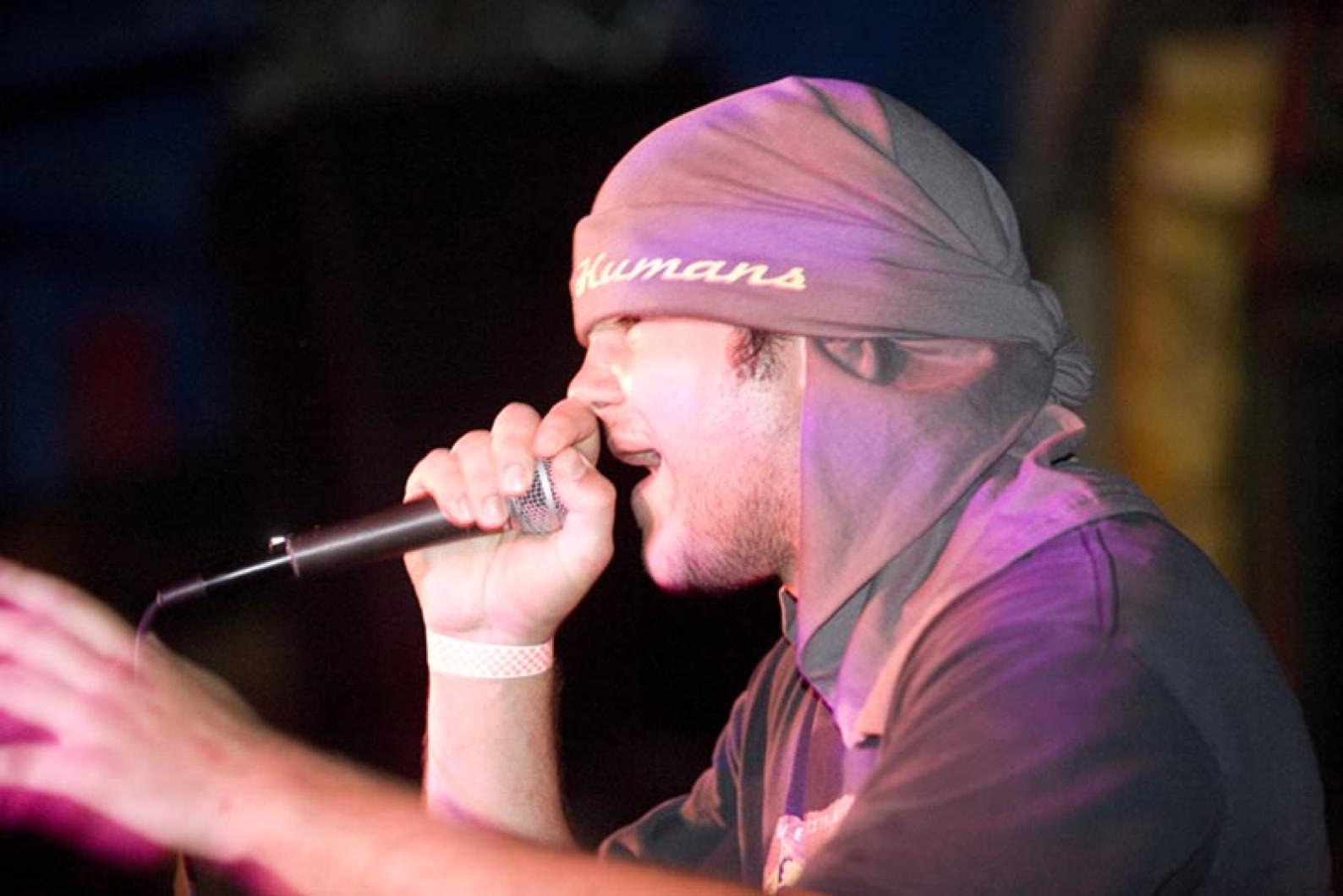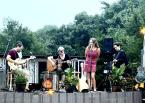The chorus was catchy, the kind that easily got stuck in your head: “When the sparks turn to flames, it’s time to play the blame game.”
The beat was almost inspirational, symphonic samples over a kick and a snare.
“Yo, who’s them four MCs with the same name?” rapped Robert (Bubba) Brown, Matt Lucier and Andrew Larsen, all seniors at Martha’s Vineyard Regional High School, together with their friend Henry Peacor from Colorado College.
On stage at Outerland were Complex Humans, five friends expressing themselves through that rhythmic poetry commonly known as hip-hop music.
The group’s deejay, Tyler Hathaway, a graduate of the regional high school, stood in the back adjusting his equipment. Through the mikes came, “It’s Complex...”
“Humans,” the crowd of mostly high school students yelled back, their volume a reflection of the energy and comeraderie onstage. The group members were clearly enjoying themselves, smiling as they slapped hands with friends in the crowd.
The Complex Humans show last Friday was both a success and a demonstration of hip-hop’s growing influence on the Island’s youth.
Kids walk the halls of the high school beat-boxing to themselves. More of them are freestyling — improvisational ryhming — at parties. Spoken word is now a regular affair at talent shows and coffee shops, and high school groups such as Complex Humans and The Cedar Trio are performing at venues from Edgartown to Vineyard Haven.
Tom Corr, a 2005 Island graduate working at the show, represented how far hip-hop had come in just the three years since he left the high school. “We had bands but it was never hip-hop,” he said outside the club.
Inside, girls lined the front of the stage, many lip-synching to their favorite songs, which are posted on Complex Humans’s MySpace page. Guys in backwards Boston caps clustered around them, their outstretched arms moving up and down with the beat.
“We normally don’t book hip-hop here,” explained Whitney Dailey, a talent buyer for Outerland. But as demand for the genre increases, the venue is looking to expand its repertoire. This summer the club that has featured Lou Reed and Peter Tosh is bringing in acts like the alternative hip-hop deejay RJD2. “It’s something completely new for us here,” Ms. Dailey said.
A Google search for “rap” and “Martha’s Vineyard” yields links to an advertisement for Smirnoff vodka entitled Tea Partay — it’s a joke rap video that starts off with three preppy white guys calling out stuff like, “Where my WASPS at?” and “M.V. — Martha’s Vineyard, holla back!”
Michael McCarthy is the director of guidance at the high school, but also knows Matt, Andrew and Bubba through his job as the assistant coach of the football team. He tells a story of an away game at Lee High School in Weston, Mass. The football team stayed in the town overnight, and the Lee team hosted them at a cookout. The boys from Complex Humans began rapping with the other team. “They were blowing these guys away,” Mr. McCarthy remembers. And the other team’s reaction? “‘Man, where did these kids on Martha’s Vineyard learn to rap like that?’ It was pretty hysterical, actually.”
That Vineyard kids demonstrating hip-hop skills elicits such a reaction of surprise is proof of two common misconceptions off-Island: one, that Martha’s Vineyard is an Island-wide yacht club for the upper class, and two, that hip-hop is a violent, mysogynistic idolization of material wealth found on most radio stations, an artform reserved for the cities.
But it’s not that, as hip-hop dance instructor Kelly Peters is quick to point out.
“Hip-hop started out in the Bronx,” he said over the phone Wednesday as he drove to a rehearsal in New York. “But it’s a culture, a vibe, energy and a formula that can be used anywhere.”
A history of hip-hop on the Vineyard wouldn’t be complete without mentioning Mr. Peters, who brought hip-hop dance to the Island in 2000 and ran a studio in Vineyard Haven until 2005.
“I introduced the hip-hop culture,” Mr. Peters said. “Emceeing and deejaying are part of the elements of that culture. That’s starting to flourish on the Island.”
Mr. Peters, who is African American, said that when he would take his predominantly white hip-hop dance group to competitions in Boston and New York he met the same sort of shock from off-Island people. “We always got that, always. ‘Oh these white kids,’” he said. “But it’s not about color. It’s not about where you’re from. It’s the skills you provide.”
For the members of Complex Humans, their music reflects their surroundings.
“We probably all do the gangster thing,” Bubba deadpanned. Sitting in his T-shirt and khaki shorts, he let the joke hang for a moment. “Naw, I’m just kidding.”
It was a sunny afternoon, just hours before their show, and the group members took a break from their sound check to talk about their musical philosophy, creative process and influences. They had clearly spent a lot of time thinking about it all, and they were eager to tell someone the story of how it all started: the freestyling that led to writing that led to their first performance as a group last summer.
“This is the hip-hop generation,” Andrew said.
“It’s natural,” Henry added.
“It’s a huge, swirling sea of ideas,” Andrew continued. He was wearing a Bob Marley shirt; he had wrapped a Complex Humans shirt around his head so that the group’s name was displayed across his forehead.
“There are crazy things going on in the world right now,” he added, comparing the current era to the 1960s.
For influences, they threw out names like Atmosphere and Aesop Rock — Caucasian underground stars known for their socially conscious lyrics. And they mentioned Willie Mason, whose acoustic Jack Johnson style couldn’t be further from hip-hop. But he was an Islander who has made it big. “Made us feel like we could do it, too,” Bubba said.
“We love all music,” Andrew said. “It would be awesome to rap while Bach played the organ.”
It was the seclusion of winter on the Island that drove these boys towards writing in the first place, a hibernation into the studio they called it.
“People are given a lot of time to think, a lot of time to create,” Andrew said.
It was a theory shared by the other members in the group, other high schoolers, Mr. Peters and the high school principal, Margaret (Peg) Regan. As the vacationers leave and the summer restaurants shut down, it is artistic endeavors that keep year-rounders going.
“We are our own entertainment,” Mrs. Regan said. “You don’t get cultural stuff in the winter unless you create it yourself.”
Friday night, the members of Complex Humans showed the crowd what had helped them get through winter. Their peers screamed and cheered. Their parents beamed from the crowd, holding camcorders and cameras. And they stood on stage, doing what felt good.
“It used to be that rebellious was cool,” Mr. Peters said when the story was relayed to him. “But if you can do something that your parents support, that you enjoy and that’s cool, I think it’s good stuff.”
Complex Humans will perform on Island this summer; watch for listings in the Gazette’s Vineyard Week calendar.







Comments
Comment policy »